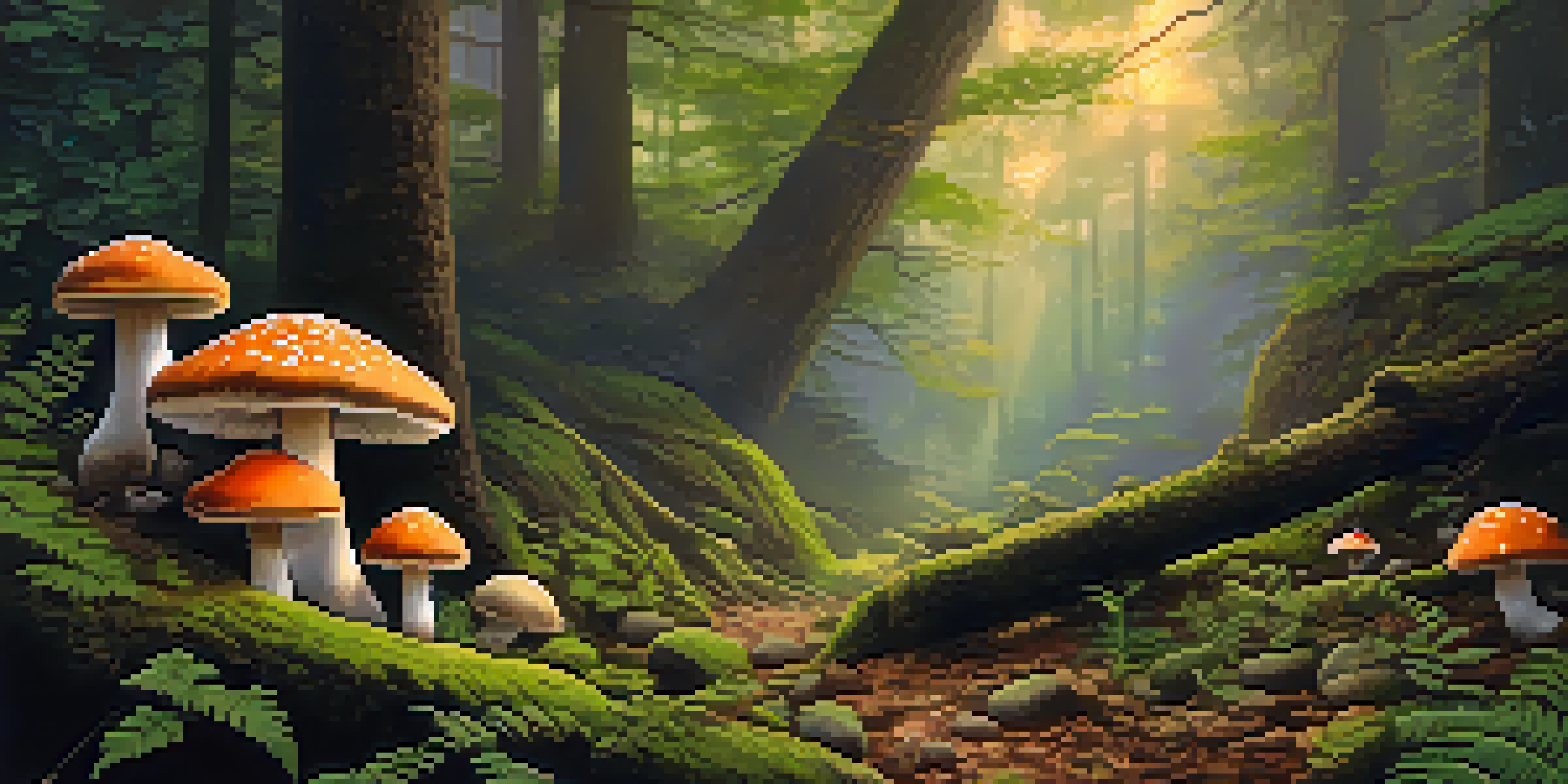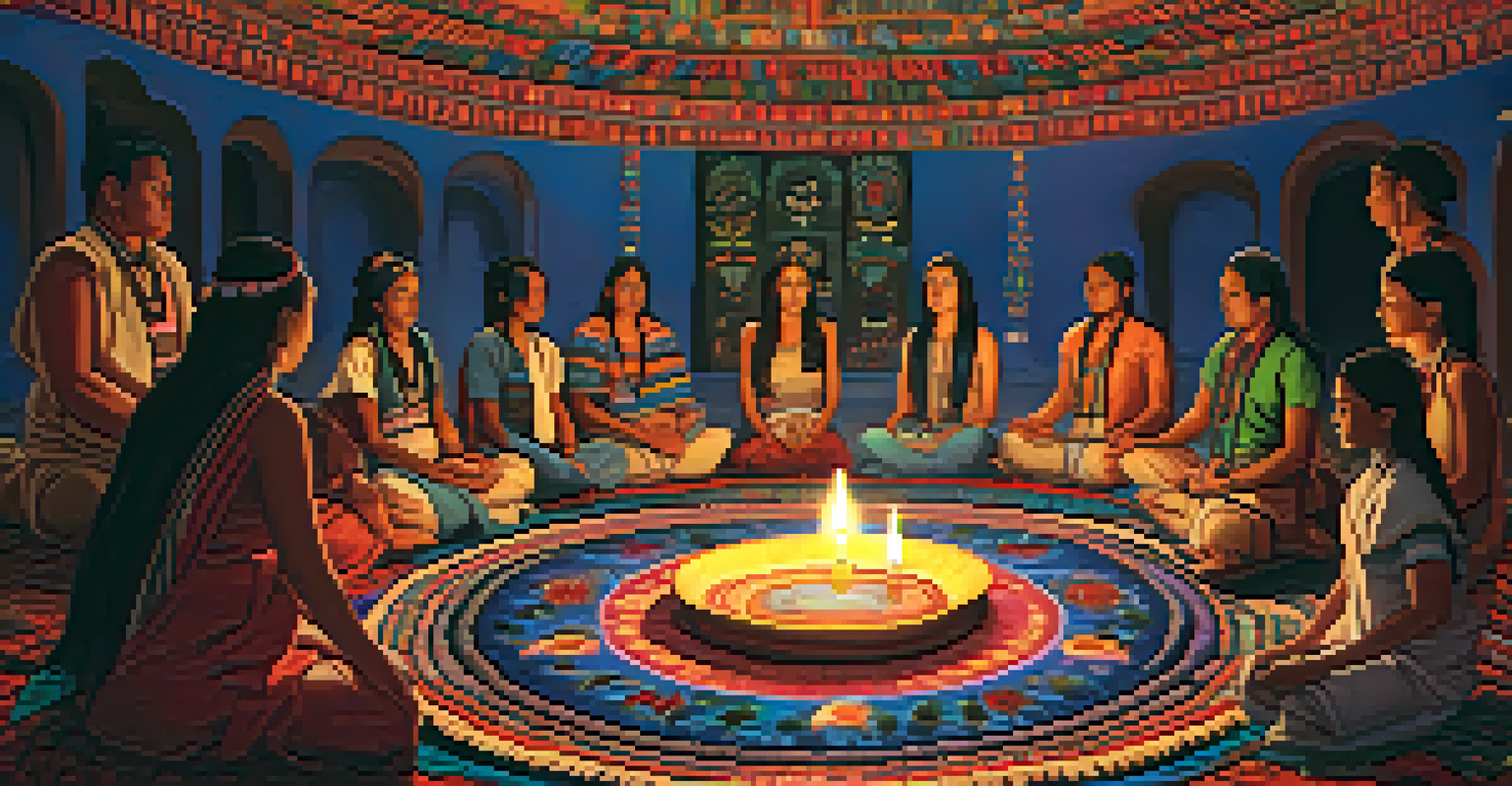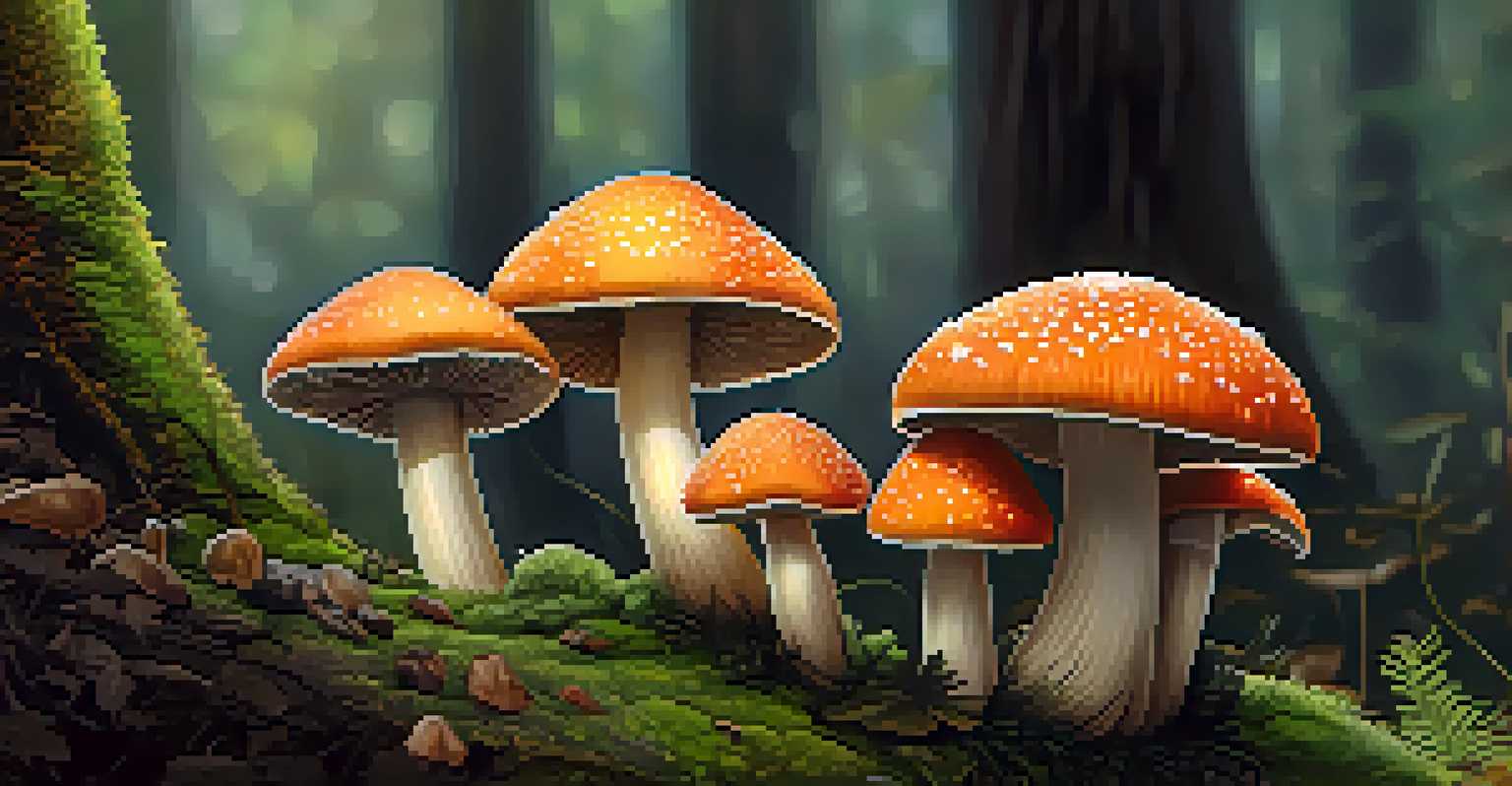Cultural Perspectives on Psilocybin Mushrooms Worldwide

Introduction to Psilocybin Mushrooms and Their History
Psilocybin mushrooms, often referred to as magic mushrooms, have been used for centuries in various cultures for their psychoactive properties. They contain psilocybin, a compound that, when ingested, converts into psilocin, leading to altered perceptions and consciousness. Historically, these mushrooms have played a significant role in spiritual rituals and traditional medicine, offering a glimpse into the human experience beyond the ordinary.
Psilocybin mushrooms offer a way to explore the depths of human consciousness and connect with the spirit world.
From the ancient Aztecs in Mexico, who viewed these fungi as sacred tools for communication with the divine, to modern-day research exploring their therapeutic benefits, psilocybin mushrooms have woven through humanity’s fabric. They were often used in religious ceremonies, symbolizing a connection to nature and the universe. Today, as society reevaluates their place, the dialogue around these mushrooms is gaining momentum.
Understanding the historical context of psilocybin mushrooms is essential as it shapes current perspectives in various cultures. As we delve deeper into the cultural significance, we can appreciate the diverse views and practices surrounding these fascinating fungi around the globe.
Indigenous Practices and Spiritual Uses
In many indigenous cultures, psilocybin mushrooms are considered sacred and are integral to spiritual practices. For instance, the Mazatec people of Oaxaca, Mexico, have long used these mushrooms in healing rituals, believing they connect them with the spirit world. During ceremonies, participants consume the mushrooms to gain insights, seek guidance, and heal emotional wounds.

These spiritual uses highlight a profound respect for the natural world and the belief in a greater interconnectedness. The experience is often described as a journey where individuals confront their fears, gain clarity, and foster a deeper understanding of their place in the universe. Such practices underscore the importance of mushrooms as tools for personal and communal transformation.
Historical Importance of Psilocybin
Psilocybin mushrooms have a rich history across cultures, serving significant roles in spiritual rituals and traditional medicine.
As interest in psychedelics grows, there’s a renewed focus on these indigenous practices, emphasizing the need for respectful integration of traditional knowledge into modern contexts. This cultural reverence for psilocybin mushrooms serves as a reminder of the rich history and wisdom that exists within indigenous communities.
Western Societal Views and Scientific Research
In contrast to traditional uses, the Western perspective on psilocybin mushrooms has evolved significantly over the past few decades. Initially demonized and associated with counterculture movements in the 1960s, recent scientific research has ignited a renewed interest in their therapeutic potential. Studies have shown promising results in treating conditions like depression, anxiety, and PTSD, leading to a shift in public perception.
The use of psychedelics in therapy can facilitate profound experiences that lead to lasting change.
Organizations and researchers are now advocating for psilocybin's legalization for therapeutic use, pointing to its ability to facilitate profound experiences that can lead to lasting change. This juxtaposition of scientific inquiry and cultural stigma reflects a broader societal challenge of reconciling ancient wisdom with modern scientific understanding. As more individuals share their positive experiences, the narrative around psilocybin mushrooms continues to change.
The growing acceptance of psilocybin in Western medicine highlights an important dialogue about mental health treatment options. As we navigate these evolving perspectives, it’s essential to consider how cultural attitudes shape our understanding and acceptance of such substances.
Legal Status and Global Perspectives
The legal status of psilocybin mushrooms varies widely across the globe, influencing cultural perceptions and usage. In some countries, like the Netherlands and Jamaica, psilocybin is decriminalized or legal, allowing for open exploration and use in both recreational and therapeutic contexts. This stands in stark contrast to places where psilocybin is strictly prohibited, often leading to a shadowy underground culture.
Countries that embrace psilocybin often experience a vibrant dialogue around its benefits, fostering communities that support research and education. These environments encourage responsible use and promote understanding of the mushrooms’ effects, contributing to a more informed public. Conversely, in regions where psilocybin is illegal, misinformation and fear can perpetuate stigma.
Evolving Western Perspectives
Recent scientific research is reshaping the Western view of psilocybin mushrooms, highlighting their therapeutic potential for mental health.
Understanding these legal frameworks is crucial as they directly impact cultural attitudes towards psilocybin mushrooms. As the global conversation shifts, many advocates are working to influence policy changes that reflect the growing body of research supporting the mushrooms' benefits.
Modern Rituals and Therapeutic Practices
As interest in psilocybin mushrooms surges, modern rituals and therapeutic practices are emerging, drawing inspiration from traditional uses. Guided ceremonies, often led by trained facilitators, integrate elements of mindfulness and intentionality, creating a safe environment for participants to explore their inner landscapes. These settings strive to honor the sacred nature of the experience while ensuring participants’ well-being.
These contemporary practices often blend elements of psychology, spirituality, and community support, providing a holistic approach to healing. Participants report transformative experiences, gaining insights that lead to personal growth and emotional healing. This modern synthesis of ancient rituals and modern science exemplifies the evolving understanding of psilocybin's potential.
As these practices gain traction, they challenge prevailing notions about psychedelics and mental health, opening avenues for more inclusive discussions. This shift highlights the importance of creating safe spaces for exploration and healing, honoring the legacy of psilocybin mushrooms in a contemporary context.
Cultural Misappropriation and Ethical Considerations
With the rise in popularity of psilocybin mushrooms, concerns about cultural misappropriation have surfaced. As Western individuals and companies adopt these practices without proper respect or understanding of their origins, it raises ethical questions about who benefits from these traditions. Many indigenous communities emphasize the importance of acknowledging the source of these practices and compensating them fairly.
Cultural appropriation can undermine the significance of psilocybin mushrooms in their traditional contexts, reducing rich spiritual practices to mere trends or commodities. It’s crucial to foster dialogues that honor the roots of these practices while ensuring that the voices of indigenous communities are heard and respected. Building partnerships based on mutual respect and understanding is essential for ethical engagement.
Ethical Cultural Integration
As interest in psilocybin grows, it is essential to respect indigenous practices and ensure ethical engagement with their cultural significance.
As we continue to explore psilocybin mushrooms, it’s vital to approach these conversations with awareness and sensitivity. Recognizing the intricate relationships between culture, spirituality, and healing can guide us toward a more respectful and inclusive discourse.
Future Directions and Cultural Integration
Looking ahead, the future of psilocybin mushrooms in various cultures appears promising yet complex. As research continues to unveil their therapeutic benefits, there is potential for broader acceptance and integration into mental health practices. This shift invites a reevaluation of cultural narratives surrounding psilocybin, encouraging dialogue between traditional and modern perspectives.
The challenge lies in balancing respect for indigenous practices with the modern exploration of psilocybin's potential. Open conversations that honor the wisdom of traditional uses can pave the way for ethical integration into contemporary settings. This collaborative approach can enrich our understanding and appreciation of psilocybin mushrooms and their role in human experience.

As we move forward, fostering global dialogues about psilocybin mushrooms can lead to a culturally informed understanding of their significance. Embracing diverse perspectives will not only enhance therapeutic practices but also celebrate the rich cultural heritage associated with these enchanting fungi.